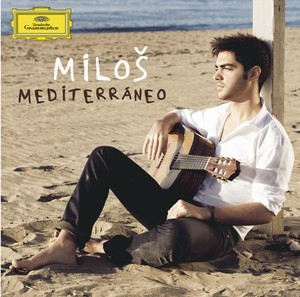Today we’ve Easter-themed music from Haydn and a rare chance to hear some delectable Grieg played by an old master. A kitsch Russian classic is given a new slant, and two Italians have serious fun with Gershwin.

John Cage, the focus of an adventurous three-day mini-festival in Bristol, is possibly one of the most influential figures in 20th-century culture. As much a practical philosopher as a composer of note, he made artists, writers and musicians think about the nature of chance, our place in nature and the role of the subject in the creative process.

This weekend's classical highlights comprise an eloquent tribute to a 20th-century master, entertaining cabaret songs from Weimar-era Berlin and some sublime Bruckner choral music recorded by an Edinburgh choir.

The most interesting thing about Louis Andriessen's musical snapshot of the famous eroticist Anaïs Nin - being given its UK premiere at the Queen Elizabeth Hall last night - was that the scene on the chaise longue in which Nin (Cristina Zavalloni) simulates riding her father was nowhere near the most unsettling episode. As ever, De Staat, the Dutch composer's seminal 1970s orchestral work of superabundant rhetorical fury took first prize in knocking the stuffing out of us.

Bear with me while, like supergroomed rising star Miloš Karadaglić retuning his guitar to a mellower vein, I adjust my concert-hall vocab and describe this as a no-gimmicks sell-out gig underground with young musicians from the London Philharmonic’s Foyle Future Firsts scheme presenting two varied sets and Karadaglić headlining. And now I’ll just revert to old habits and declare the meat to be a slice of Classicism chromatically spiced (Mozart) and a 20th-century maverick pushing Neo-Baroque into near-atonality (Stravinsky), our top guitarist serenading by way of late-night coda. All this to listen to with the intent of a seasoned concertgoer or to doze to with drink in hand, as you please.
Not that some of the sweet juve players were entirely cool with it. When you've always kept your audience at arm's length in a recital space, it can't be easy to find folk at tables right under your nose texting and quaffing. But the point is that this was good practice even for the less seasoned meeters-and-greeters, since the set-up had to include introductions varying from the read-out high-falutin programme note your average newcomer to classical cabaret just wouldn't get to a bluff line in curt preface: of the Poulenc Sonata for trumpet, trombone and horn, we were told, "One critic said that this was 18th-century music with wrong notes. They're not wrong notes, and we hope you like it."
I did, and I also liked bassoonist Laura Vincent's personable introduction to the two movements of Stravinsky's Septet, toughest numbers on the programme for which there was no avoiding a bit of explanation about a passacaglia and a gigue verging on atonality; she even got away with the "Stravinsky was the Madonna of his time" line. And James Turnbull is a natural, brimming with genuine enthusiasm for one of the best oboe pieces not actually written for oboe, as he put it: "Nightclub 1960" from Piazzolla's History of the Tango, transcribed from the flute-and-guitar original. He delivered it with panache alongside subtle harpist Elizabeth McNulty, whose earlier glissandi in the Debussy Trio had showered stardust over late, lamented Humphrey Lyttleton's stuffy but ever-atmospheric venue (reprieved, I'm delighted to hear, from imminent execution).
 The "sets" were well thought out in chunks of 25 minutes each, the first sandwiching the Debussy and a movement from the Ravel duo-sonata - stunningly executed by violinist Emily Dellit and cellist Arturo Serna - between Stravinsky's trio arrangement of numbers from The Soldier's Tale, and the Poulenc, showcasing a nice line in vibrato-ed trumpet song from Ellie Lovegrove. Good to know, too, that laughing at musical humour is not the prerogative of all-too-knowing Wigmore old-timers. The slow movement from Mozart's Quintet for piano and winds was the stilling heart of the second sequence, nicely set up by a Julian Anderson miniature and bringing together seven of the 14 players (most of them pictured above) sharing the platform for the later Stravinsky. Some of the groups need to loosen up and just enjoy the freedom such a space can give them, but again, it's all good practice, and drew the listeners in even as the old air con chuntered and the bar flies chattered.
The "sets" were well thought out in chunks of 25 minutes each, the first sandwiching the Debussy and a movement from the Ravel duo-sonata - stunningly executed by violinist Emily Dellit and cellist Arturo Serna - between Stravinsky's trio arrangement of numbers from The Soldier's Tale, and the Poulenc, showcasing a nice line in vibrato-ed trumpet song from Ellie Lovegrove. Good to know, too, that laughing at musical humour is not the prerogative of all-too-knowing Wigmore old-timers. The slow movement from Mozart's Quintet for piano and winds was the stilling heart of the second sequence, nicely set up by a Julian Anderson miniature and bringing together seven of the 14 players (most of them pictured above) sharing the platform for the later Stravinsky. Some of the groups need to loosen up and just enjoy the freedom such a space can give them, but again, it's all good practice, and drew the listeners in even as the old air con chuntered and the bar flies chattered.
Total silence, on the other hand, greeted the star turn. Fair enough, 28-year-old Karadaglić has a new CD to flog, his first for Deutsche Grammophon. Surely conscious of the matinee-idol looks which are going to be a selling point, he accounted for himself in a manner both much slicker and at the same time seemingly less sincere than the youngsters. But he was here on the eve of his Wigmore recital to show his artistry, and if the injunction "let's rock" didn't translate into the results, we did have more than a sample of his poetic soul. I'm no doyen of the classical guitar, and the only time I've heard the colours of a full orchestra in it was a year ago, from that absolute master Paco Peña, but there were certainly the shades and freedoms of a fine artist in the Albéniz pieces and the lullaby-esque Tarrega encore he gave us.
 Karadaglić makes much of his pride in the Montenegran motherland, and finds there's no place like home every time he plays Carlo Domeniconi's variations on a Turkish song, Koyunbaba. Well, it's not great music, even if the tune it reflects upon is of the essence, but this was just what we needed at coming up to 11 o'clock: a late-night meditation that had an air of the improvised about it. Which again is the highest praise, and makes me wonder if real improvisation might not be the next step for relaxed "classical" cabaret nights like this. Bravo to the glammy ladies of Limelight for setting them up and moving them forward; they'll surely run and run.
Karadaglić makes much of his pride in the Montenegran motherland, and finds there's no place like home every time he plays Carlo Domeniconi's variations on a Turkish song, Koyunbaba. Well, it's not great music, even if the tune it reflects upon is of the essence, but this was just what we needed at coming up to 11 o'clock: a late-night meditation that had an air of the improvised about it. Which again is the highest praise, and makes me wonder if real improvisation might not be the next step for relaxed "classical" cabaret nights like this. Bravo to the glammy ladies of Limelight for setting them up and moving them forward; they'll surely run and run.
- Next Limelight event in August features soprano Danielle de Niese
- Karadaglić's next recital is at the Wigmore Hall on 15 April
- Further details about the LPO Foyle Future Firsts scheme
Next page: Karadaglić plays part of Albéniz's Asturias

Under starter’s orders, baton raised, and they’re off! Following on the heels and wheels of the Grand National and the F1 Grand Prix, the grand adventure of Maazel’s Mahler marathon with the Philharmonia is up and running, albeit at a more moderate pace, although the indefatigable octogenarian whips up a fair head of steam when called for. This particular “celebration” of Mahler’s death 100 years ago (come 18 May), will last until October, allowing for a summer break. The Philharmonia tour, like any respectable travelling show, will take in parts of the UK that many other orchestras don’t reach, like Gateshead and Hull, as well as Germany, naturally, and odd other places like Paris and Luxembourg. So they can’t be accused of not sharing the spoils around or sparing themselves.
Under starter’s orders, baton raised, and they’re off! Following on the heels and wheels of the Grand National and the F1 Grand Prix, the grand adventure of Maazel’s Mahler marathon with the Philharmonia is up and running, albeit at a more moderate pace, although the indefatigable octogenarian whips up a fair head of steam when called for. This particular “celebration” of Mahler’s death 100 years ago (come 18 May), will last until October, allowing for a summer break. The Philharmonia tour, like any respectable travelling show, will take in parts of the UK that many other orchestras don’t reach, like Gateshead and Hull, as well as Germany, naturally, and odd other places like Paris and Luxembourg. So they can’t be accused of not sharing the spoils around or sparing themselves.


As Handel’s Messiah is to Christmas so the music of Bach is to Lent. Every Passiontide churches and concert halls are flooded with performances that include everything from dainty consort renderings of the St John Passion to choral societies delivering all but symphonic St Matthew Passions. Mightiest of all, however, is The Bach Choir’s annual concert. Performed on Palm Sunday to a reliably sold-out Royal Festival Hall, it’s a fixture of over 80 years' standing and a rare opportunity to hear the work sung in English. Love or hate the vernacular approach, it’s hard to argue with the sheer force of almost 200 singers accompanied by a gloriously inauthentic, 50-strong incarnation of Florilegium.


There is a change to our coverage of classical CD releases. Since theartsdesk began in September 2009, we have been reviewing on a monthly basis. As of today we're switching to weekly and our round-up of the new classical albums will now appear every Saturday. To mark the change, we have a bumper helping, with Tansy Davies's new release taking a bow as our Disc of the Day. As for the rest, there's a Russian flavour – historic, idiomatic performances of Tchaikovsky symphonies, and exciting readings of Shostakovich piano concertos. Enjoy French sisters playing piano duets and a glorious Handel oratorio, and be soothed by the most alluring of sackbut recitals.

